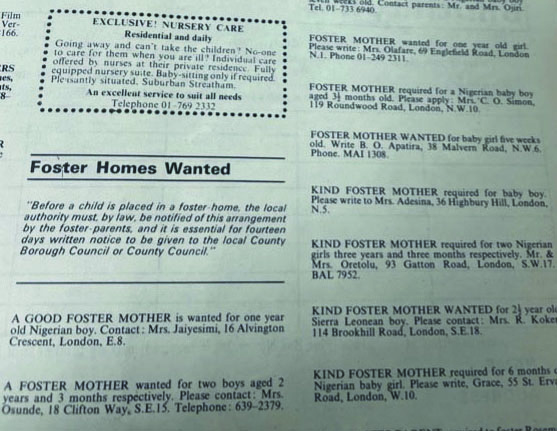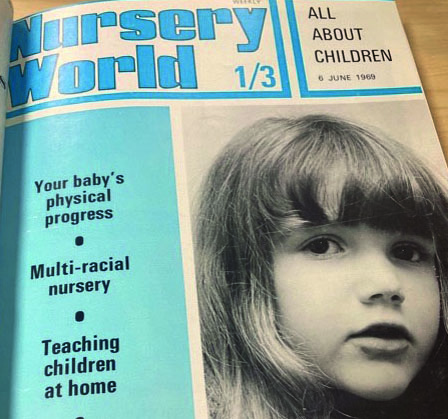
‘30th October 1958: FOSTER MOTHER wanted for two West-African babies, girl 1½ years, boy 4 months. Apply’
August 2023. It was one of the warmest summers on record and I was taking a long bus ride to the former church building in Dulwich, London, which now serves as Nursery World’s HQ. I was there to check out the archive which, I soon discovered, was a large cupboard towards the back of the building.
 My name is Seun Matiluko and I am a journalist who recently joined BBC Sounds. After a long development process, I decided to make a podcast about the UK’s largest African group: West Africans. Census data suggests Nigerians are the largest of the West African group, followed by Ghanaians.
My name is Seun Matiluko and I am a journalist who recently joined BBC Sounds. After a long development process, I decided to make a podcast about the UK’s largest African group: West Africans. Census data suggests Nigerians are the largest of the West African group, followed by Ghanaians.
As a British woman, born to Nigerian parents, I am curious about what it means to be both West African and British today. Is it possible to authentically be both? My podcast, which launched on 15 February, is called Talking Drum: British AND West African, and is named after the popular West African musical instrument used to spread important messages.
After deciding the focus of the podcast, I knew one of the episodes had to cover ‘farming.’
In 2019, I had the privilege of interviewing actor Adewale Akinnuoye-Agbaje following the release of his directorial debut Farming. The film follows a character called Enitan, based on a young Adewale, who is placed with a white working-class family by his Nigerian parents who came to the UK to study. The film was called Farming because so many West Africans privately fostered their children between the 1950s and 90s that the media started calling the practice ‘farming’ after the Victorian-era pejorative ‘baby-farming’, which was often used to describe the placement of children with ill-equipped carers.


PHOTO: A page showing adverts from the Foster Homes Wanted section in an archive issue of Nursery World. Adverts like these ran in the magazine, particularly during the 1950s and 1960s
My parents, and many from their generation, hadn’t thought ‘farming’ was a big deal. It was just one of those things.
As I read more on the topic, I learned about famous figures who had been ‘farmed’, like the musician Seal. Born in 1967, Seal told The Guardian he was raised by ‘a bit of a patchwork family’.
Despite scouring the internet, and tackling a few books that referenced farming, I couldn’t find answers to most of my pressing questions. A 1968 newspaper report claimed up to 5,000 African children were privately fostered across Britain each year. Why were so many West Africans privately fostering their children? Why did white foster families take these children in? And what did the now adults, who were raised by white foster parents, think of their British and West African identities?
I needed to speak with people, and the podcast provided the perfect opportunity to do so.
I sat down with academic Jordanna Bailkin, who explained the realities of 1950s colonial, and then post-1960s Commonwealth, immigration. I interviewed three former foster children: the Olympian Kriss Akabusi, entrepreneur Akua Gyamfi and musician Ric Flo. And I caught up with Nobel Prize winner Wole Soyinka, who had privately fostered his first child while a student in 1950s Leeds.
During our conversation, Professor Bailkin highlighted that many West Africans placed adverts for foster parents in Nursery World.
After our chat, I decided to trek to Dulwich. Sure enough, in the ‘Foster Homes Wanted’ sections of the magazines were countless ads.
A lot of the general public haven’t heard of baby farming. It’s a secret, from Britain’s recent past, that is slowly starting to be revealed. I hope my podcast can help reveal more about this hidden corner of British history.
- Listen to the episode on Seun's Talking Drum podcast on BBC Sounds









